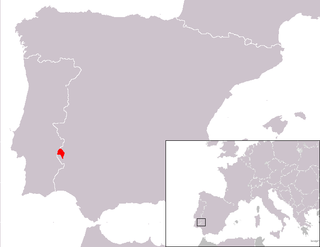| Oliventine Portuguese | |
|---|---|
| Português oliventino | |
| Native to | Portugal, Spain |
| Region | Olivença, Táliga |
Native speakers | (undated figure of 3,600[citation needed]) |
| Language codes | |
| ISO 639-3 | – |
 | |
Oliventine Portuguese[1] (also known as Portuguese from Olivença)[2] is the dialectal variety of the Portuguese language natively spoken in the disputed municipalities of Olivença and Táliga, in Extremadura (Spain). Currently, the Portuguese of Olivença and Táliga is not recognized by Spain, which has administered this territory since the War of the Oranges in 1801. Portugal, however, does not recognize Spanish sovereignty over the region and claims it as its own.[3][4]
As a result of two centuries of Spanish administration and isolation from Portugal, Oliventine Portuguese is now a dying language; only a few elderly people still use it and young people no longer speak it.[2][5] The dialect is no longer spoken in Táliga.[6]
Portuguese ceased to be the language of most of the population after the 1940s, a process accelerated by the Hispanicization policy implemented by Francoist Spain.[5][7][8]
- ^ Andrade, Laura González (27 July 2012). "Portugués oliventino en conserva". Hoy (in Spanish). Retrieved 6 June 2017.
- ^ a b Merlan, Aurelia (2009). El mirandês: situación sociolingüística de una lengua minoritaria en la zona fronteriza portugués-española (in Spanish). Oviedo: Academy of the Asturian Language. ISBN 9788481684612.
- ^ "Olivença é Portugal. É bom não esquecer!". O Notícias da Trofa (in Portuguese). 21 February 2013. Retrieved 6 June 2017.
- ^ Marcos, Jairo (12 August 2014). "Olivenza (Badajoz), zona de conflicto internacional". El Confidencial (in Spanish). Retrieved 6 June 2017.
- ^ a b Torre, J. R. Alonso de la (13 February 2011). "En la época de Franco, los libros sobre Olivenza Estaban prohibidos". Hoy (in Spanish). Retrieved 6 June 2017.
- ^ "Olivença, português, cultura". Port.Pravda.ru. 5 July 2010. Retrieved 6 June 2017.
- ^ Torre, J. R. Alonso de la (4 April 2010). "Con el franquismo, la Olivenza portuguesa se difuminó bastante". Hoy (in Spanish). Retrieved 6 June 2017.
- ^ Madrinha, Mariana (26 April 2016). "Olivença. Além Guadiana, fala-se cada vez mais português". Sol. Retrieved 6 June 2017.